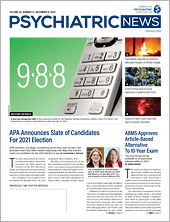In September, Congress passed the National Suicide Hotline Designation Act of 2020 (S 2661), which President Donald Trump signed into law in October.
The legislation follows action by the Federal Communications Commission (FCC) to designate 988 (see
Psychiatric News) as the universal number for the National Suicide Prevention Lifeline (1-800-273-TALK) by July 16, 2022. It would operate as a mental health crisis hotline system, connecting individuals to local community resources.
“The National Suicide Hotline Designation Act is key to the successful implementation of 988,” said Kimberly Williams, president and CEO of Vibrant Emotional Health, which administers the National Suicide Prevention Lifeline. “There’s an opportunity with 988, with the appropriate funding and dedicated resources, to be able to create a more robust crisis continuum of care in communities where that just doesn’t exist right now.”
The legislation essentially sets the groundwork for the infrastructure and resources that will be necessary for 988’s successful implementation. It requires the Substance Abuse and Mental Health Services Administration (SAMHSA) and the Veterans Administration (VA) to complete a report within six months to determine exactly what resources are required to make 988 operational and effective. It also allows states to levy fees, similar to the fees associated with 911, on mobile services to pay for the services associated with 988.
The legislation was sponsored by Sens. Cory Gardner (R-Colo.), Tammy Baldwin (D-Wis.), Jerry Moran (R-Kansas), and Jack Reed (D-R.I.). In a letter to the senators late last year, APA CEO and Medical Director Saul Levin, M.D., M.P.A., voiced APA’s support for the legislation and noted the importance of the SAMHSA and VA report.
“Clear fiscal estimates will facilitate a better understanding about the resources needed to implement, support, and sustain the hotline,” Levin wrote. “It is essential that all Americans, no matter where they live, have access to the life-saving services that a fully national hotline is intended to provide.”
The fact that the FCC approved 988 and Congress passed legislation to support the necessary infrastructure is significant not just for crisis services, but for mental health services generally, said Matthew Goldman, M.D., M.S., a member of APA’s Council on Advocacy and Government Relations and an associate medical director of San Francisco’s Department of Public Health’s Comprehensive Crisis Services.
“In one sense, 988 is the next step to mental health parity,” he said. “We have 911 if you’re having a heart attack, but calling 911 when someone is having a mental health crisis often gets a police response, rather than an ambulance response.” If people in crisis are able to get the appropriate services as soon as possible, they may be able to avoid unnecessary trips to the emergency department or clashes with police, he said.
The hotline’s implementation may also push states and localities to develop more robust crisis care systems. “We’re anticipating that 988 is going to get more than suicide prevention calls,” he said. “It’s going to get called by people who are experiencing crises like a psychotic episode, intense emotional distress, or a substance use disorder relapse.” Resources will be necessary to ensure those callers get the appropriate response.
The implementation of 988 “is really a game changer for our society,” Williams said. “By designating a three-digit number, we are telling Americans that you now have an easy-to-remember, easy-to-access way to directly connect to immediate crisis support and care. It also helps to destigmatize access to mental health resources by encouraging help-seeking behavior.”
During the transition to 988, people who need help should continue to contact the National Suicide Prevention Lifeline by calling 1-800-273-8255 (1-800-273-TALK) and through
online chats.
Veterans and service members may reach the Veterans Crisis Line by pressing 1 after dialing,
chatting online, or texting 838255. ■
APA’s letter of support is posted
here.
“New Opportunities to Improve Mental Health Crisis Systems” by Goldman and colleagues is posted
here.

